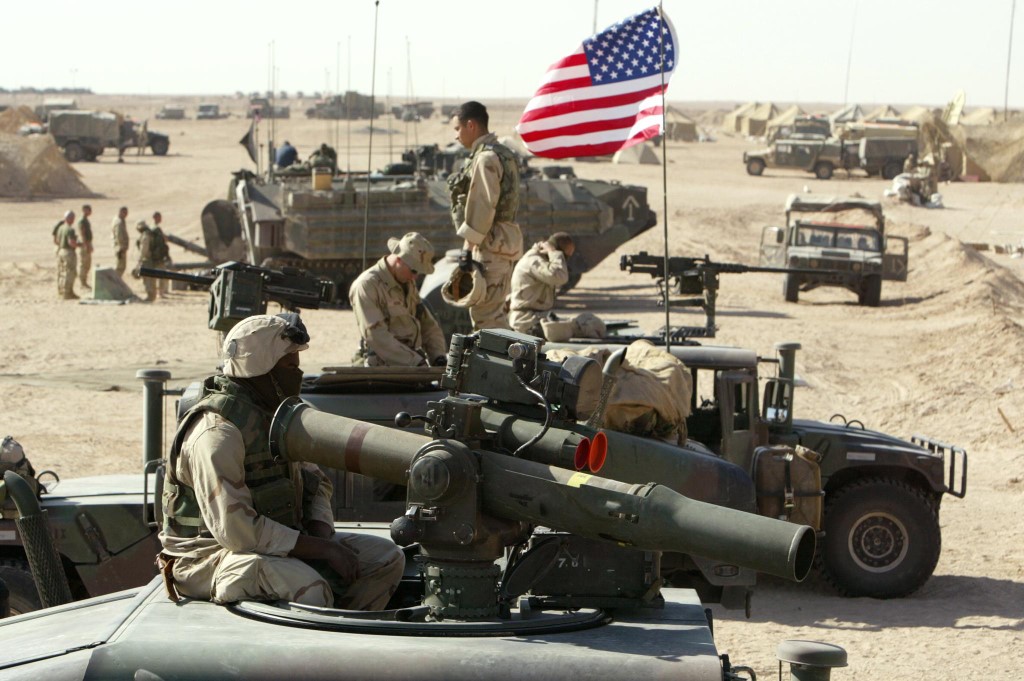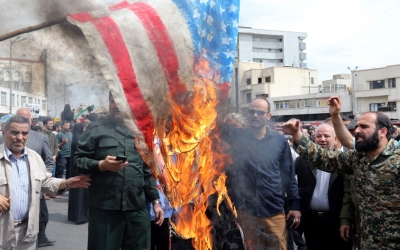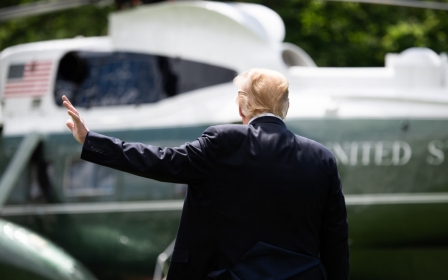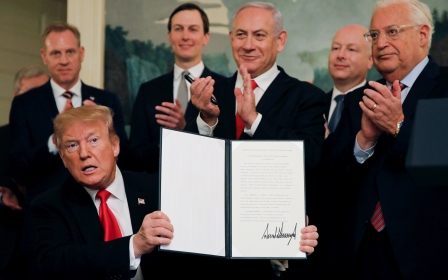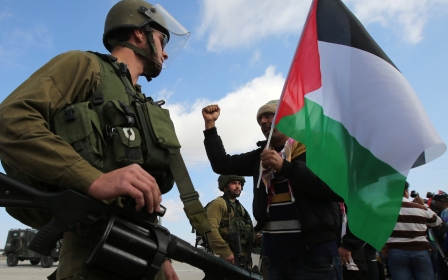Gulf rulers would have Arabs believe Iran - and not Israel - is their enemy
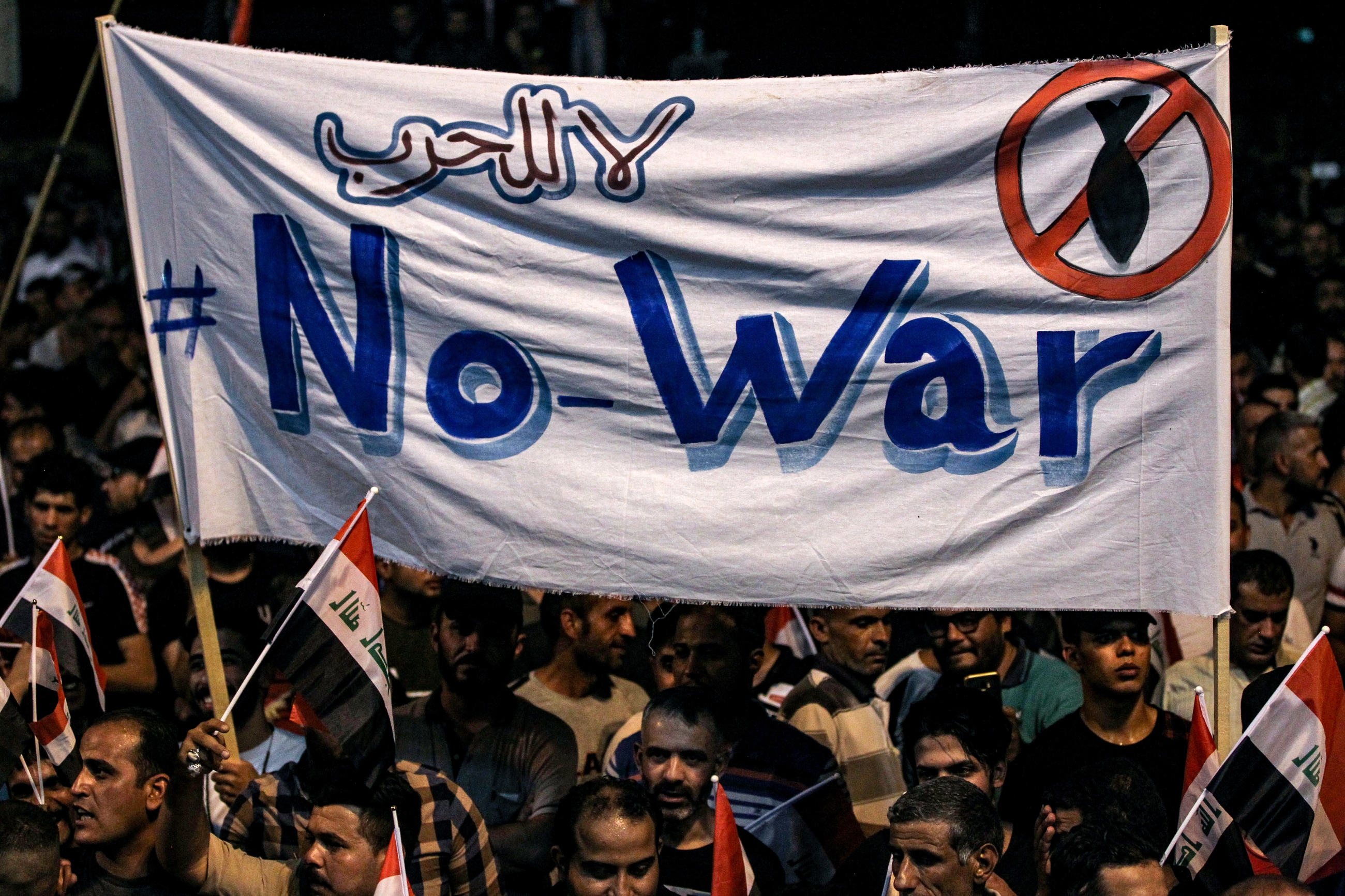
Who is the main enemy of Arabs: Israel or Iran? This was never a question that was entertained in the Arab world - until recently.
The majority of Arabs understood that they - primarily the Palestinians, but also Lebanese, Syrians, Egyptians and Jordanians - have been victims of Israeli aggression.
Less understood is the fact that Israel has targeted the Arab world's religious and ethnic diversity by seeking to mobilise divisions, initially by targeting Arab Jews for recruitment to its cause but also by supporting separatist sectarian and ethnic projects. For example, its support - whatever the merits of the movements - and alliance with Lebanese Maronite separatists, Iraqi Kurds, and South Sudanese separatists.
The establishment of Israel in 1948 introduced a predatory state that began to raid and invade its neighbours immediately. After conquering much of Palestine, Israel launched numerous cross-border raids against its neighbours, including the full-scale invasion of Gaza and Egypt in 1956.
A history of invasions
Since then, Israel has invaded and raided Egypt, Jordan, Syria and Lebanon multiple times, in addition to attacks in Tunisia, Sudan and Iraq - not to mention its 1973 downing of a Libyan civilian airliner.
It did all of this while continuing to oppress the Palestinian people through expulsion, military occupation, land theft and racist colonial laws. This earned Israel the hatred and ire of most Arabs, except for those dictatorial Arab regimes that conspired with it.
Iran, in contrast, has not invaded an Arab country in recent history - though it funds armed groups across the region - and was in fact invaded by Iraq in the 1980s. Saddam Hussein launched a war at the behest of the ruling oil families of the Gulf and Western imperial interests, who were threatened by the 1979 Iranian Revolution that overthrew the Shah.
In line with the Israeli strategy to divide the Arab world along ethnic and sectarian lines, propaganda from Saddam and the oil families stressed the Persianness of Iran
The Shah was a feared ally of the ruling oil families. In addition to the anti-Arab ideology that permeated Iranian culture under the Shah, he made claims on parts of the United Arab Emirates, occupying several UAE islands in 1971, and claimed Bahrain as part of Iran until 1970. These imperial claims never stood in the way of Iran's close political and military alliance with Arab Gulf regimes; the Shah enjoyed friendly coverage in their official media.
In line with the Israeli strategy to divide the Arab world along ethnic and sectarian lines, propaganda from Saddam and the oil families during the 1980s war stressed the Persianness of Iran (which has an Arab population) against the Arabness of Iraq and the Gulf states (which have Persian populations) - but it did not include even a whiff of sectarian propaganda against Shiism, nor was Iran presented as the major enemy of all Arabs or compared with the Israeli enemy.
Sectarian propaganda
Saddam's propaganda harkened back to the dawn of Islam, dubbing his invasion "Saddam's Qadisiyyah" - a reference to the Battle of Qadisiyyah, fought in 636 between Arab Muslims and the Sasanian Empire, in which the Arabs defeated the Zoroastrian Persians.
Saddam's war bankrupted Iraq, and early Iraqi victories turned into defeats by the end of the war, leading him to resent the oil families, who had abandoned him by then.
In retribution, Saddam invaded Kuwait in 1990. This led the US to invade the Gulf in 1991 and to invade Iraq in 2003, killing hundreds of thousands of Iraqis. In 2004, Iran quickly established strong connections with Iraq's emergent new rulers, set up by the occupying Americans who, in line with Israeli strategy, insisted on establishing a sectarian and ethnic arrangement in post-invasion Iraq.
Iran's new close relations with Iraq alarmed the Gulf regimes, especially Saudi Arabia, which launched a sectarian campaign against Iran and Shia Muslims, Persian and Arab alike. Beginning in 2004, the Arab peoples were subjected to unprecedented propaganda identifying Iran and Shia as the main enemy of Arabs.
Fifteen years on, this campaign has cost hundreds of thousands of Iraqi, Lebanese, Syrian and Yemeni lives - sacrificed at the altar of the oil families - and it is now demanding that the Palestinian people give up all their rights in order to preserve the oil families' thrones.
The campaign was inaugurated by Gulf ally King Abdullah II of Jordan, who announced in 2004 the formation of a Shia "crescent" extending from Iran through Iraq and Syria to southern Lebanon. The campaign agitated against Shia populations in the Arab world and Iran, claiming they were "worse" than the colonising Israelis.
That Israel was a close ally of the Shah and an enemy of the Iranian Revolution was hardly coincidental.
A 'common interest'
Thus began the attempt to redefine Iran, rather than Israel, as the main enemy of the Arabs. Wars were launched in Lebanon, Iraq and Syria to destroy ecumenical life across the Arab world and advance Israeli hegemony. Israel, which was kicked out of Lebanon in 2000, re-invaded in 2006 to destroy Hezbollah, but was again defeated.
Terrified by this defeat, the oil families and their Western sponsors quickly began to fund and arm anti-Shia groups in Iraq and Lebanon - and later in Syria and Yemen - that continue to wreak havoc and cost hundreds of thousands of Arab lives of all religious denominations.
As a result of the Western-backed and Gulf-funded militias in Syria, who took over large swaths of the country and opposed the Syrian regime on a sectarian basis - a development that changed the direction of the Syrian revolt that had started initially as a non-sectarian call for democracy against dictatorship - Iran and Hezbollah were invited to help the regime stave off these attacks.
In the summer of 2013, both Iran and Hezbollah came to the assistance of the Syrian regime, providing battlefield support after the large successes of the sectarian militias. These interventions added more fuel to the Gulf propaganda against Iran and Shias, which had preceded them by a full decade.
By 2019, Israel was declared a main ally of Arabs against Iran, as per the February conference in Warsaw. Israeli Prime Minister Benjamin Netanyahu declared that Arab countries were "sitting down together with Israel in order to advance the common interest of war with Iran". The major obstacle to integrating Israel fully in this new alliance remained the Palestinian people.
In addition to the sectarian horrors launched across the region, the price to neutralise the perceived Iranian threat was to be paid also by Palestinians. It is in this context that the oil families became the main subcontractors of US President Donald Trump's "deal of the century," which requires that Palestinian rights be liquidated once and for all and that the principle of Zionist settler colonialism in Palestine, Syria and swaths of southern Lebanon be accepted, recognised and celebrated by all Arabs.
But why would Palestinians and other Arabs pay the price to preserve the thrones of Gulf rulers? Iran, at worst, could only threaten unpopular Gulf regimes, while Israel continues to threaten the entire Palestinian people - indeed, all Arabs.
Betting on making Arabs see non-existent Iranian threats and attempting to blind them to the real Israeli ones is a risky business at best, regardless of the amount of propaganda saturating the Gulf-owned Arab media. Trump's business acumen, or lack thereof, can do very little to minimise this risk.
The views expressed in this article belong to the author and do not necessarily reflect the editorial policy of Middle East Eye.
Middle East Eye propose une couverture et une analyse indépendantes et incomparables du Moyen-Orient, de l’Afrique du Nord et d’autres régions du monde. Pour en savoir plus sur la reprise de ce contenu et les frais qui s’appliquent, veuillez remplir ce formulaire [en anglais]. Pour en savoir plus sur MEE, cliquez ici [en anglais].



